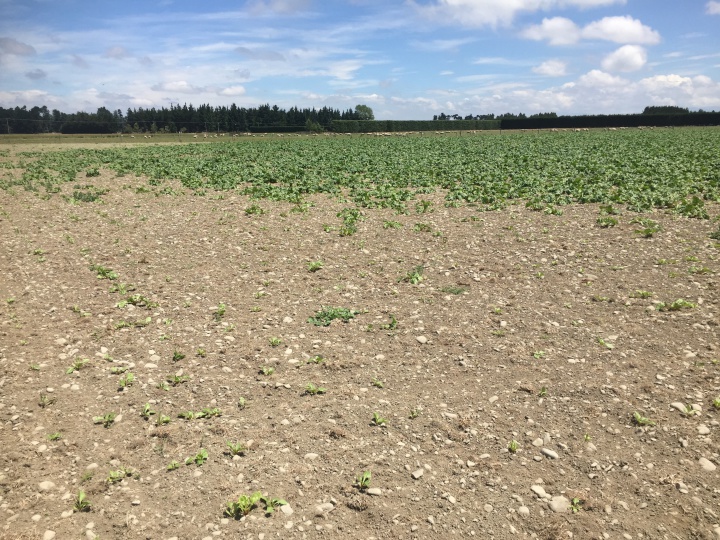NZ needs more water storage in a changing climate
NZ needs more water storage in a changing climate
The importance of water storage in helping provide a reliable supply of water for urban communities, and for food and energy production in a changing climate needs to be recognised, says IrrigationNZ.
“We are seeing the effects of poor future planning for the effects of climate change on water infrastructure overseas, with Cape Town expected to soon run out of water. By ratifying the Paris Agreement in 2016, New Zealand confirmed it will plan for and take action to adapt to the impacts of climate change. Developing more water storage to supply towns, rural communities and for food and energy production is important to protect the future wellbeing of Kiwis,” says IrrigationNZ Chief Executive Andrew Curtis.
A new draft government report – Adapting to Climate Change in New Zealand, highlights that droughts are expected to occur more frequently and to be more severe, along with more intense rainfall and flood events.
January 2018 was the hottest month ever recorded in New Zealand. 2017 was also a year where a shortage or surplus of water created major problems with severe flooding occurring in a number of areas over the autumn and winter, followed by droughts in the spring and summer.
“Many areas went for several weeks with minimal rainfall this summer. Where water storage was available it played an important role in ensuring locally grown produce was still available in supermarkets. But there’s still a lot of work to be undertaken to improve the resilience of our communities by improving our water storage,” says Mr Curtis.
The 2012–2013 drought which affected the entire North Island and the west coast of the South Island is another example of the impact climate change could have on New Zealand’s economy and communities. It was one of the most severe experienced in these areas in at least 40 years. The economic impact of the drought was estimated to be a minimum of $1.5 billion by Treasury.
According to NIWA, New Zealand currently receives an average of 550 billion cubic metres of rain each year, of which 80 per cent flows out to sea, supporting river ecosystems along the way. Around 2 per cent is used for irrigation, urban and industrial use, with the remaining rainfall evaporating.

Without water crops don’t grow. A fodder beet crop on a Canterbury sheep farm photographed in early January, following several weeks of very low rainfall. Most of the paddock was irrigated, but the bare patches show where the irrigator didn’t reach the crop.
“Maintaining adequate river flows
and river ecosystems is important for our future, while also
looking at options to store water. Overseas water storage
projects have combined flood protection works with water
storage for urban and rural use. There are a range of
options available. Projects to recharge underground water
supplies through wetlands which provide a habitat for
wildlife have also been completed as a cost-effective way of
providing water when needed in Europe and America,” Mr
Curtis says.
In New Zealand, irrigation schemes are used to serve a number of purposes in addition to irrigation including supplying Timaru, Oamaru and Kerikeri with drinking water and farmers with stock water. Modern irrigation schemes can also be designed to provide environmental benefits by allowing river flows to be supplemented in times of low flows.
Mr Curtis says IrrigationNZ is pleased that the government has indicated it will honour existing Crown Irrigation Investments Limited commitments to support irrigation scheme modernisation and development.
“By 2050 our population is expected to
reach 6 million. We'll need to feed more people from the
same land area, and supply water and power to new homes and
businesses. Water is critical to our nation's wellbeing. We
must continue planning today to ensure we can meet New
Zealand’s needs in the future,” he adds.
Ends


 The Reserve Bank of New Zealand: Christian Hawkesby Appointed As Governor Of The RBNZ
The Reserve Bank of New Zealand: Christian Hawkesby Appointed As Governor Of The RBNZ Kiwi Economics: It’s Mayhem In Markets As Downside Risks Dominate Following Trump’s Tariffs
Kiwi Economics: It’s Mayhem In Markets As Downside Risks Dominate Following Trump’s Tariffs Mindful Money: Consumer Demand For Ethical Investing Remains Strong Despite International Headwinds
Mindful Money: Consumer Demand For Ethical Investing Remains Strong Despite International Headwinds Greenpeace: Taranaki - Greenpeace Activists Stop Unloading Of Palm Kernel Sourced From Indonesian Rainforests
Greenpeace: Taranaki - Greenpeace Activists Stop Unloading Of Palm Kernel Sourced From Indonesian Rainforests Seafood New Zealand: Seafood Situation Saved By A Sausage - New Plymouth Locals Innovate, Using Crayfish Bait
Seafood New Zealand: Seafood Situation Saved By A Sausage - New Plymouth Locals Innovate, Using Crayfish Bait Takeovers Panel: Takeovers Panel Convenes Meeting To Inquire Into The Acquisition Of Shares In NZME Limited
Takeovers Panel: Takeovers Panel Convenes Meeting To Inquire Into The Acquisition Of Shares In NZME Limited



